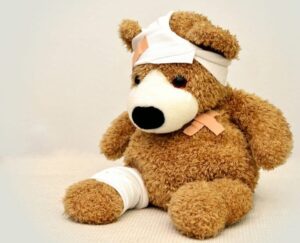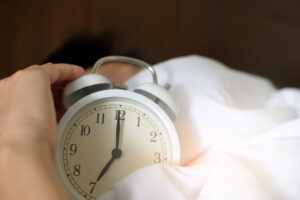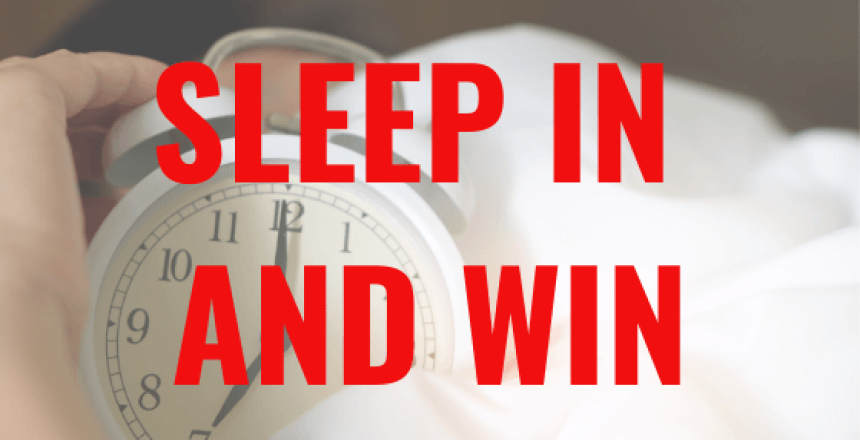Sleep In and Win
You need to sleep to recover.
An interesting study “The effects of sleep extension on athletic performance of collegiate basketball players”:
It was found1 that sleeping a minimum of 10 hours a night over 5 weeks, players had:
- Improved shooting performance
- Improved sprint times
- Decreased fatigue
- Enhanced overall physical and mental wellbeing
You need to understand that you must sleep to…
Recover after injury

In a small study in mice, it was found that sleep deprivation (72 hours without sleep) reduced the mice’s ability to recover damaged muscle. It was also found that Sleep deprivation could, in fact, increase the adverse effects of high-intensity exercise.2
This means that your injuries could take longer to heal if you do not sleep.
Improve your immune system

It was found from 23 participants with partial sleep deprivation (waking up at 3 AM), there was a significant decrease in cells that play a significant role in your immune system in nearly 80% of the participants (these cells are Natural Killer Cells, for More information on these cells click here).
Decrease Your Waistline

In a study with nine subjects, one group with 3.5 hours of sleep for three nights in a row, and another with seven hours of sleep three nights in a row; it was found that3:
- Fullness decreased, and hunger increased in the deprived sleep group.
- The chemicals involved in the “fight or flight” response increased in the deprived sleep group.
- It seems that our anxiety and hunger went up, and our fullness went down… We all know what that means!!!
Bottom line
Sleep is so essential for our wellbeing. This is only a small illustration of what effects sleep can have on our body and mind!
How much sleep do you need?

According to the sleepfoundation.org4 here is the current guideline for sleep:
Newborns (0-3 months): Sleep range narrowed to 14-17 hours each day (previously it was 12-18)
Infants (4-11 months): Sleep range widened two hours to 12-15 hours (previously it was 14-15)
Toddlers (1-2 years): Sleep range widened by one hour to 11-14 hours (previously it was 12-14)
Preschoolers (3-5): Sleep range widened by one hour to 10-13 hours (previously it was 11-13)
School age children (6-13): Sleep range widened by one hour to 9-11 hours (previously it was 10-11)
Teenagers (14-17): Sleep range widened by one hour to 8-10 hours (previously it was 8.5-9.5)
Younger adults (18-25): Sleep range is 7-9 hours (new age category)
Adults (26-64): Sleep range did not change and remains 7-9 hours
Older adults (65+): Sleep range is 7-8 hours (new age category)
As always, if you have any questions, please let us know!
Further Reading:
Does improving sleep lead to better mental health? A protocol for a meta-analytic review of randomised controlled trials
If you are looking to get started in your fitness journey, then check out my blog “How do I start Exercising”. Click here
References
- Mah CD, Mah KE, Kezirian EJ, Dement WC. The Effects of Sleep Extension on the Athletic Performance of Collegiate Basketball Players. Sleep. 2011;34(7):943-950. doi:10.5665/SLEEP.1132
- Yang D-F, Shen Y-L, Wu C, et al. Sleep deprivation reduces the recovery of muscle injury induced by high-intensity exercise in a mouse model. Life Sciences. 2019;235:116835. doi:10.1016/j.lfs.2019.116835
- Hibi M, Kubota C, Mizuno T, et al. Effect of shortened sleep on energy expenditure, core body temperature, and appetite: a human randomised crossover trial. Sci Rep. 2017;7(1):1-11. doi:10.1038/srep39640
- Hirshkowitz M, Whiton K, Albert SM, et al. National Sleep Foundation’s updated sleep duration recommendations: final report. Sleep Health: Journal of the National Sleep Foundation. 2015;1(4):233-243. doi:10.1016/j.sleh.2015.10.004


